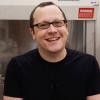
John Castorino

John Castorino received his B.S. in biology from Ursinus College and his Ph.D. in cell and developmental biology from Thomas Jefferson University.
His current research focus is examining the intracellular trafficking of the cancer-related protein CD147 and a family of monocarboxylate transporters. Due to the excellent work of his students, a new trafficking partner of CD147 has recently been identified. His other research interests include messenger RNA stability, microRNAs, and other gene expression regulation mechanisms.
Castorino has advised students on a wide array of projects such as generating neurons in tissue culture from stem cells, making stem cells from somatic cells, cricket epigenetics, and biological animation. Outside of the laboratory, his interests lie in electronics, art, and zymurgy.
Recent and Upcoming Courses
-
Exercise Science 101 with Certified Personal Trainer Certification
-
Cell biology laboratory skills are the core foundational skills for all biomedical research. Students will maintain mammalian cell lines throughout the semester and conduct experiments using their cells using techniques such as transfections, fluorescence microscopy, proliferation assays, migration assays, and transwell invasion assays. The end of the semester will be reserved for students to design and conduct their own cell biology experiments. Students must also enroll in Cell Biology (NS-247), the main course component. Keywords:Biomedical research, neuroscience, cancer, stem cells
-
Cells are the foundation of all life. The structures and processes inside cells determine how life functions (or dysfunctions). We will discover what is known about how cells work through a combination of primary literature, laboratory research, and textbook readings. We will also discuss what is still not known and how scientists work to find the answers. The class structure will be divided into one day of lecture and one day of problem set review. Students that take Cell Biology will also be enrolled in Cell Biology Laboratory (NS-246), the laboratory component of the course. Keywords:Biomedical research, neuroscience, cancer, stem cells
-
Cancer is currently the second largest cause of death in the United States. One would think that science would have developed a cure for cancer by now, but it hasn't. Why is developing treatment options so difficult? This course will address the biology of malignancy and treatment including some traditional and cutting-edge strategies. We will uncover the truth behind cancer misconceptions and explore some of the ethical and social justice considerations of disease research (including some of the darker examples from cancer research's past). We will also work in the laboratory a little to study cancer first-hand. Students will develop skills in reading primary literature, writing papers, and performing presentations Keywords:Cancer, genetics, biomedical research, bioethics, disease treatment
-
This introductory laboratory-intensive course will explore the process of doing scientific research in a molecular biology lab (which is relevant to many fields of science including neuroscience and other types of biomedical research). Students will learn numerous techniques in the lab, including DNA isolation, PCR, gel electrophoresis, restriction enzyme digests, cloning, and basic microscopy. Students will engage in a semester-long laboratory research project within a cancer biology gene cloning context. Students will perform protocols, collect and analyze data, and report their conclusions in written and oral formats. This course is intended for students with little or no experience in a biology lab, and it will help prepare students for other laboratory courses such as Cell Biology. Students must be able to come into the laboratory to complete work 10-12 hours per week in the laboratory, including coming in outside of designated class time. Keywords:Laboratory research, genetic engineering, cloning, neuroscience, cancer
-
Creating interesting project ideas in the area of biomedical research is one of the most fun and rewarding aspects of this type of work. But to ask really good questions, you need to understand the work that has been accomplished previously. This requires delving into primary scientific literature in exquisite detail, and primary literature is almost another language. Working with primary literature requires a lot of practice and repetition in order to become comfortable. Students will search for papers in their field of interest and share them with their classmates through oral presentations. As the semester progresses, we will go over the papers in more and more detail. For the final project students will write a review article using the sources they have reviewed during the semester Keywords:biomedical research, genetics, neuroscience, cancer, disease
-
Genetically modified organisms. Human-machine neural interfaces. Designer babies. Personalized medicine. Gene therapy. Synthetic organisms. Society is at an interesting intersection where some of these technologies are commonplace and some are at the early stages of being implemented. We will cover the science, history, and ethics surrounding these (and other) technologies that may change what defines humanity of the future. Students will each choose a specific biotechnology to explore in a semester-long series of projects. KEYWORDS:Biotechnology, Medical Technology, Neuroscience, Cellular Biology, Molecular Biology

